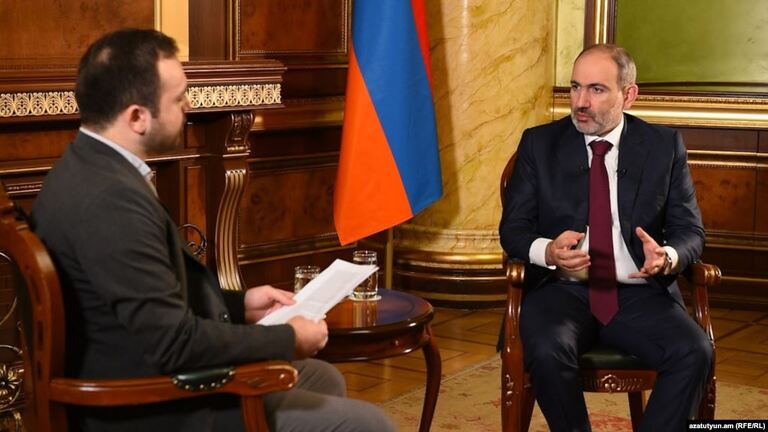Azerbaijan shelling RA border settlements
On September 13, from 00:05, the units of the Azerbaijani Armed Forces started firing intensively from artillery and large-caliber rifles in the direction of Goris, Sotk, and Jermuk towards the Armenian positions. The Azerbaijani side was also using UAVs. Later, because of the tension on the border, the Regional Rescue Departments of Gegharkunik, Syunik, and Vayots Dzor of the Ministry of Internal Affairs and Communications were put on high alert to respond in case of need. Armenian PM Nikol Pashinyan had a telephone conversation with Vladimir Putin. The Prime Minister gave details about the provocative, aggressive actions by the Azerbaijani Armed Forces in the direction of the sovereign territory of Armenia that started at midnight, which were accompanied by firing from artillery and large-caliber firearms. Nikol Pashinyan considered the actions of the Azerbaijani side unacceptable and emphasized the importance of an adequate reaction from the international community. At around 3 am RA Ministry of Defense reported that the Armenian side has victims and wounded. As of now, the confirmed number of victims is 49. Early in the morning, Armenian Foreign Minister Ararat Mirzoyan informed his Russian counterpart, Sergey Lavrov, about the situation created as a result of Azerbaijani aggression against the sovereign territory of Armenia. RA National Assembly Speaker Alen Simonyan announced that RA Prime Minister Nikol Pashinyan would come to the National Assembly to present the situation at that moment.
“The intensity of combat operations has decreased. Azerbaijan’s attacks continue in both directions. At midnight, in fact, the Armed Forces of Azerbaijan launched military actions in the direction of Armenia, in 4 directions, later 2-3 more directions were added. Azerbaijan is trying to present that these actions were a response to some provocations by Armenia, but we must unequivocally record that this information is absolutely false and a lie. It is obvious that as a result of the 44-day war, yes, we suffered heavy losses, but the Republic of Armenia was not broken, if you let me say that. Basically, the position of Azerbaijan, which is expressed or was expressed during the negotiation process, is as follows: they said that they do not want to discuss the Karabakh issue with Armenia, because their position is that the Karabakh issue is resolved, or at least it is an internal issue of Azerbaijan, and they do not want to discuss that issue with Armenia,” Pashinyan said.
Armenia decided to appeal to Russia, CSTO, UN Security Council, in order to stop Azerbaijani aggression and eliminate its consequences. An extraordinary session of the CSTO Collective Security Council was held under the chairmanship of Prime Minister Nikol Pashinyan, in the format of a video conference. The situation on the Armenian-Azerbaijani border and further steps of the CSTO were discussed at the meeting.
Spokesperson of the Armenian Ministry of Defense Aram Torosyan reported that as of 21:00 the situation on the Armenian-Azerbaijani border continues to be tense. According to him, the intensity of the shelling of Armenian positions, settlements, and civil infrastructures, as well as the fire intensity of the positional battles in the direction of Nerkin Hand, Verin Shorzha, Artanish, and Sotk, has significantly weakened.
The region of the Armenian-Azerbaijani contact line adjacent to Gegharkunik has been relatively quiet for about an hour and a half, Karen Sargsyan, governor of Gegharkunik, told Sputnik Armenia. As a result of the aggressive attack carried out by Azerbaijan, 80 people are wounded in the region, including civilians. The administrative building of the community was bombed, and a residential house was burned.
Baku reports 50 victims
The Azerbaijani Ministry of Defense reported that 50 of its servicemen were killed in the clashes that began at midnight on the Armenian-Azerbaijani border. According to the report, 42 of the dead are servicemen, and 8 are border guards.
International reactions to the Armenian-Azerbaijani conflict
European Union’s High Representative for Foreign Affairs and Security Policy Josep Borrell issued a statement over the Azerbaijani military aggression against Armenia.
U.S. Senator Gary Peters condemned the unprovoked Azerbaijani attacks on Armenia, calling for holding Azerbaijan accountable and immediately stopping U.S. assistance to that country.
The Chairman of the Committee of Ministers of the Council of Europe and the Chairman of the Parliamentary Assembly of the Council of Europe called on the military operations on the Armenian-Azerbaijani border to ease the tension and respect the ceasefire.
MFA of Belarus urged the “friendly authorities of Armenia and Azerbaijan” to show restraint and follow the agreements reached earlier.
The Ministry of Foreign Affairs of Cyprus expressed deep concern regarding the escalation of tensions between Armenia and Azerbaijan, condemning the attack and calling for respect of the Ceasefire Agreement of November 9, 2020, to quickly de-escalate tensions.
Assistant to the Russian President for international affairs, Yuri Ushakov, called on Azerbaijan and Armenia to show restraint, to steadily maintain the ceasefire regime and, in general, to maintain the trilateral statements of the leaders of Russia, Azerbaijan and Armenia.
India encouraged Armenia and Azerbaijan to pursue talks to arrive at a lasting and peaceful solution.
US Congressman Adam Schiff and US Congressman David N. Cicilline condemned the Azerbaijani attack against Armenia.
The Ukrainian foreign ministry reacted to the Armenian-Azerbaijani border tension after Azerbaijan launched a large-scale attack on Armenia, urging the sides to a political and diplomatic settlement of the conflict in compliance with the international law norms, particularly the respect of the sovereignty and territorial integrity of states within their internationally recognized borders.
OSCE American co-chair Reeker visits Baku
The newly appointed American co-chair of the OSCE Minsk Group, the US special representative in the negotiations on Caucasus issues, Philip Reeker, will visit Baku on September 13-14. Philip Reeker is on a regional visit to the South Caucasus. On September 8-10, he had high-level meetings in Yerevan.

